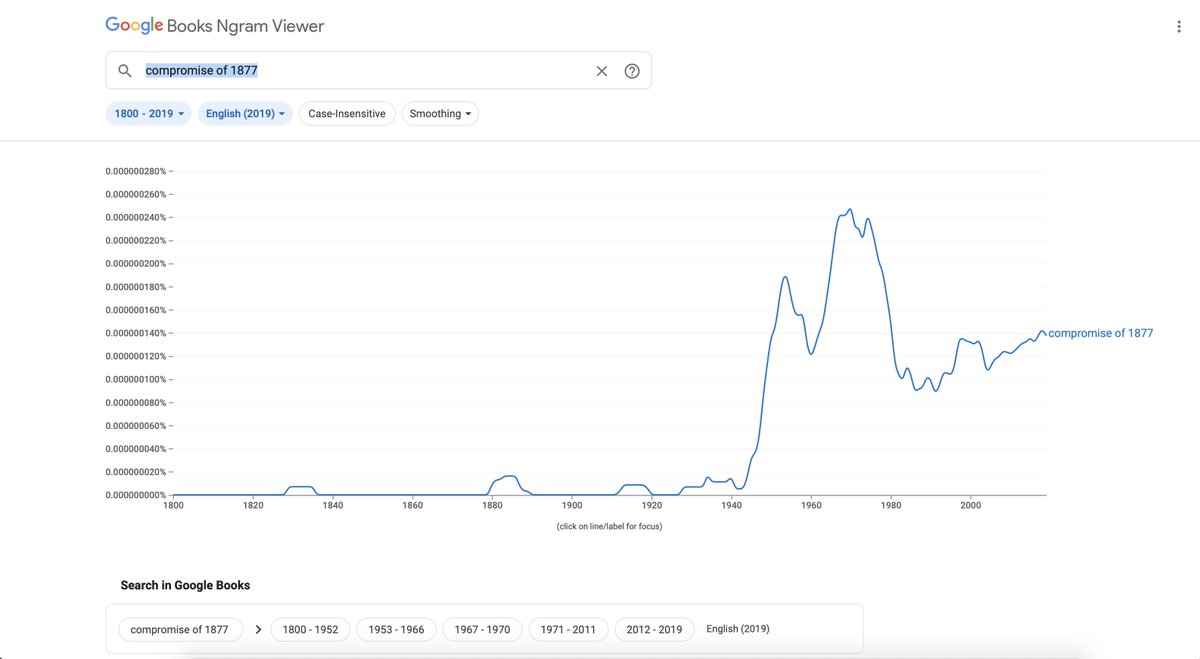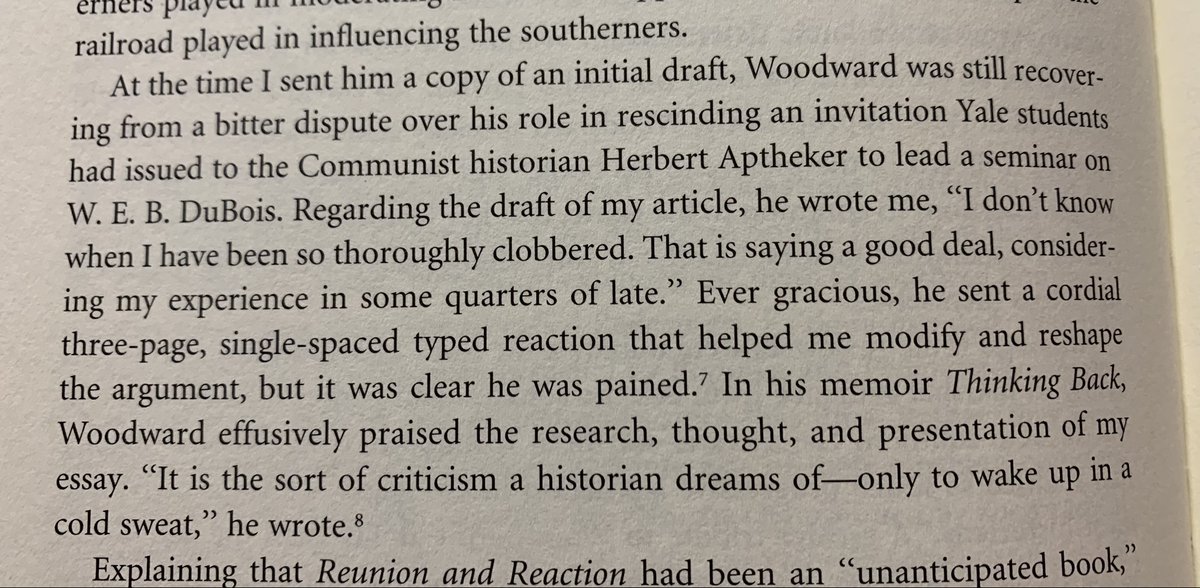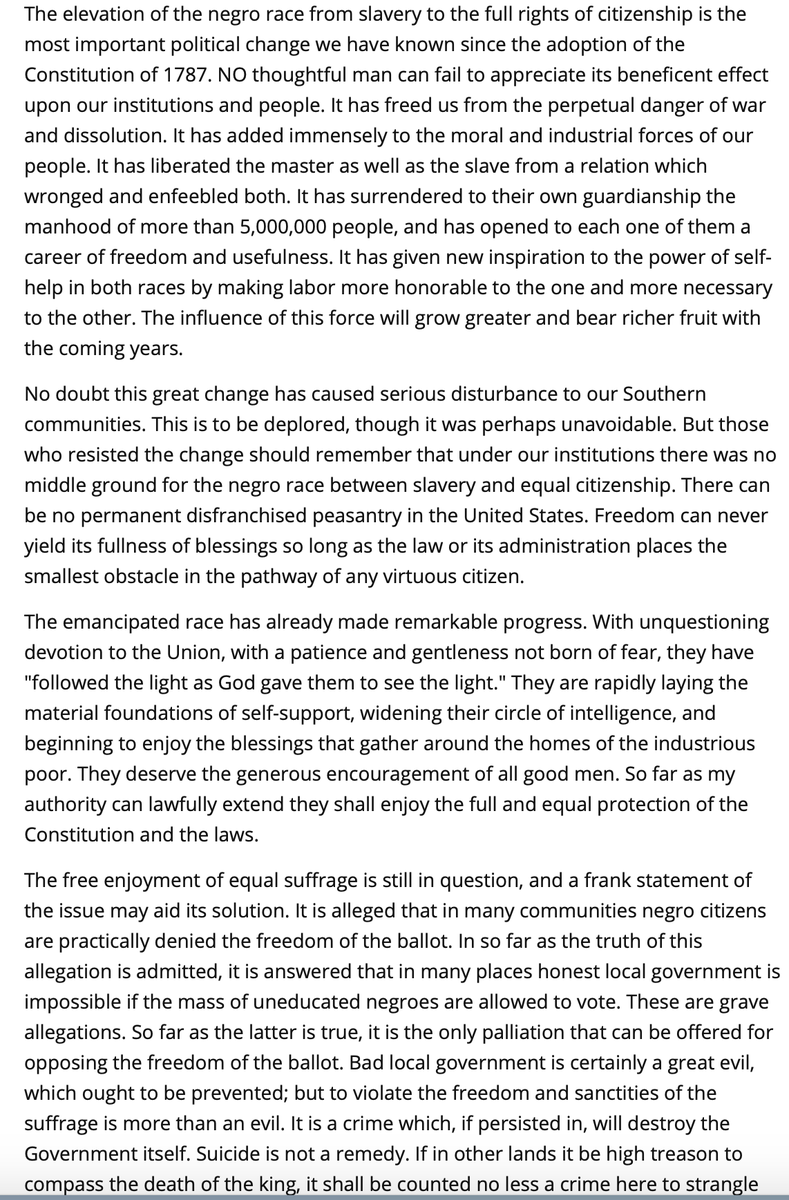As attention turns to whether President Trump will concede the election, many are invoking another contested election and its resolution: the supposed "Compromise of 1877" and the election of 1876. One problem: the compromise is a myth, long ago debunked by historians. A thread:
My good friend @rachelshelden and I wrote about the election of 1876 a few weeks ago for @madebyhistory. In that piece, we argued partisanship, voter suppression, and legal challenges held the potential to create another electoral crisis like 1876. https://www.washingtonpost.com/outlook/2020/10/20/americans-worry-about-2020-being-another-2000-real-worry-is-another-1876/
Thankfully, it appears Joe Biden's victory is decisive enough to avoid a similar crisis. But Rick Santorum's comment that President Trump will concede "if certain conditions are met" has produced a flurry of comparisons to the supposed compromise of 1877.
The comparison has come up elsewhere. A piece last week in @TIME summarized famous contested elections and included a quote from Eric Foner no less--author of the most authoritative account of Reconstruction--recycling the standard story of the compromise https://time.com/5903361/contested-election-history/
That story goes like this: after the Electoral Commission created by Congress to decide the election of 1876 awarded the presidency to Republican Rutherford B. Hayes, bitter Southern Democrats in Congress threatened to pull out all the stops to prevent Hayes from taking office.
To prevent a constitutional crisis, Republicans and Democrats met in a series of secret negotiations in February 1877 where Republicans agreed to abandon Black rights by removing remaining federal troops from the South, in return for Democrats conceding the White House to Hayes.
This theory was originally put forward by preeminent historian C. Vann Woodward in his 1951 _Reunion and Reaction_ and immediately gained traction in academic studies of Reconstruction, as well as high school and college history textbooks everywhere.
But in the 1970s and 1980s, Woodward's theory came under attack, mostly notably by Allan Peskin and Michael Les Benedict, who systematically dismantled the claims of Woodward's argument. Woodward himself later acknowledged "I don't know when I have been so thoroughly clobbered."
Yet, the myth of this supposed compromise persists. While I have not systematically examined this, some version of it still appears in every US history textbook I have looked at, like the excerpt below, as well as on innumerable popular websites:
https://www.history.com/topics/us-presidents/compromise-of-1877
https://www.history.com/topics/us-presidents/compromise-of-1877
So what's wrong with the story of the compromise?
Several things:
1. While Hayes did remove some troops upon his election, he did not actually remove all of the troops, as Gregory Downs has recently demonstrated:
https://www.mappingoccupation.org
Several things:
1. While Hayes did remove some troops upon his election, he did not actually remove all of the troops, as Gregory Downs has recently demonstrated:
https://www.mappingoccupation.org
2. Part of Woodward's argument involved Republican economic interests in the post-war South, but most of the economic favors supposedly promised during the negotiations never actually materialized.
3. For Woodward's theory to work, the negotiations had to take place in February of 1877, just before the new president took office. While there were certainly some meetings between Republicans and Democrats, it is likely the meetings took place in December, not February.
4. Woodward claimed as a result of the negotiations Southern Democrats in Congress stepped aside to allow Hayes to take office, but it was actually Northern Democrats who cleared the way while Southern Democrats continued to lead the filibuster to try and stop the results.
5. According to Woodward, the compromise supposedly ended Reconstruction, but by 1876 most white Northerners had lost interest in Black rights, and Southern Democrats had regained control of 8 of the 11 Confederate states, using violence and racism to terrorize freepeople.
6. Most important: central to the compromise is the idea that Republicans gave up on Black rights in the interest of power, but we know that Northern Republicans continued to advocate for Black rights well beyond the 1870s (see James Garfield's inaugural address, for example).
None of this is new information--historians have known these basic facts now for decades (though why Eric Foner, the most preeminent living U.S. historian, would rehash this long debunked idea is a mystery). So why does the myth of the Compromise continue to still hold such sway?
It's a story that provides a tidy end to the periodization of Reconstruction, and a traditional narrative that emphasizes the failure and disappointment of unfulfilled promises. But so much good work in the last 20 years has illustrated how arbitrary the date of 1877 really is.
Reconstruction is often misunderstood. It was chaotic, messy, and defies simple narratives. Teaching it is challenging. The myth of the compromise allows teachers and textbook authors to create a clear break between the end of one half of US history and the beginning of another.
The compromise of 1877 certainly makes for a good story--we like the idea of conspiracies and negotiations in smoke-filled rooms. And to be sure, those backroom deals happened all the time in 19th-century politics. But the Compromise of 1877 simply was not one of them. /end

 Read on Twitter
Read on Twitter





